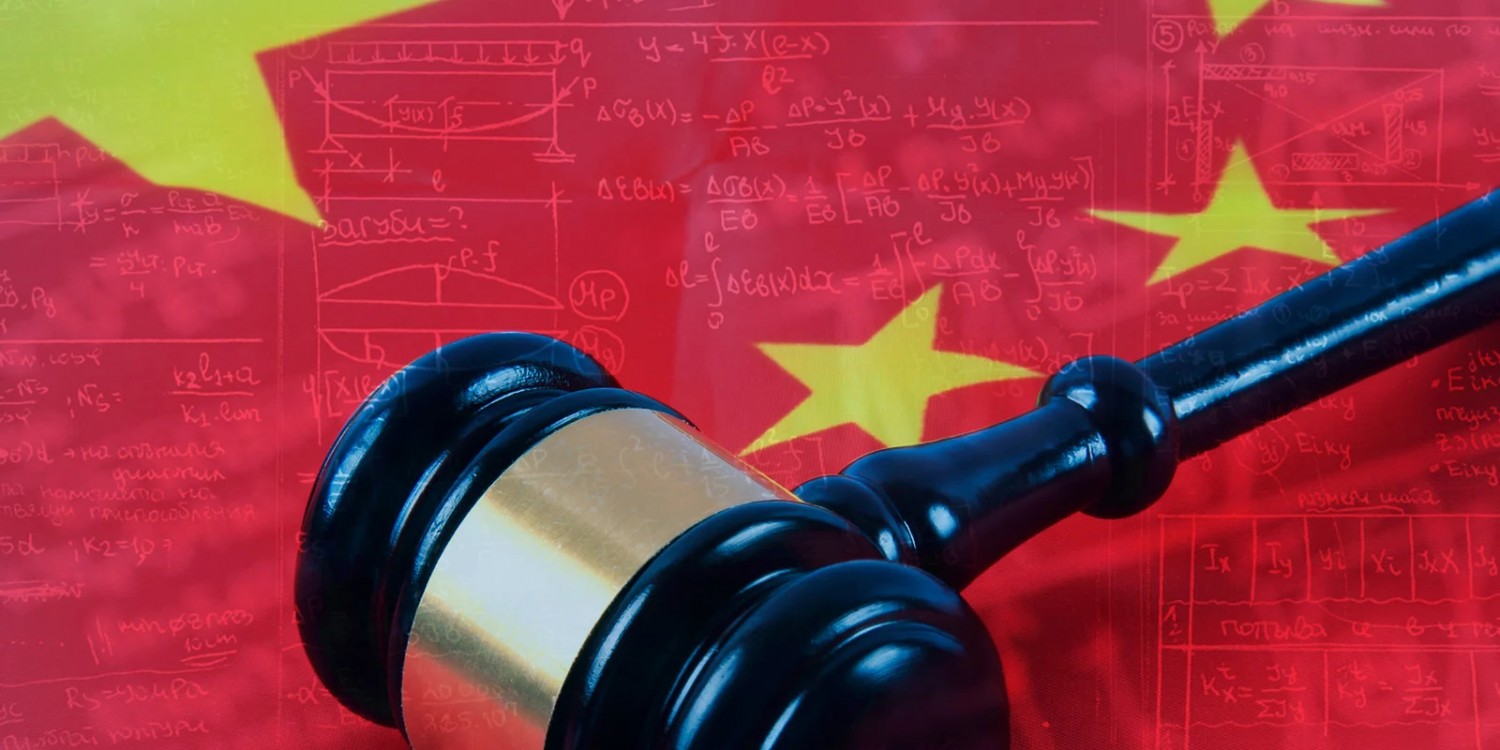Review № 8 of Chinese Antitrust News from the Experts of the BRICS Competition Centre
- Legal Management SAMR Report
- Alibaba partners with government to develop platforms
- Baidu introduced its analogue of ChatGPT
- China is growing 'little giants' and 'individual champions'
- White Paper on the Legal Governance of Cyberspace
- Every 10th graduate goes into the digital economy
- Shanghai to provide social guarantees for flexible employment
- Eligibility criteria for data export remain unclear
- U.S. Sanctions Accelerate China's Tech Development
- TikTok split from ByteDance discussed
- The EU will reduce China's dominance in the supply of "clean" technology
- DiDi will expand the range of services
On the occasion of World Defense Day of Consumer Rights (March 15):
- Consumer Privacy Report 2022
- Live Marketing Incentive Initiative
- "Iron fist" for consumer protection
Legal Management SAMR Report
In 2021, the Central Committee of the Communist Party of China and the State Council of China jointly published the Plan for the Formation of a Government Based on Law for 2021-2025. SAMR recently released an annual progress report on the implementation of this plan. It is noted that for the first time in 14 years of its existence, the Antimonopoly Law was updated: its goals included encouraging innovation, and strengthening the fundamental position of competition policy was elevated to the level of a legislative requirement. The agency is also speeding up the amendment of the Law on Combating Unfair Competition, deepening the implementation of fair competition policy, constantly improving the stable, transparent and predictable “traffic light” rule system (red and green light for the actions of business entities), improving the viability of all forms of capital including private. SAMR requires a level playing field for market entry, fair treatment of market participants, and encourages and supports the healthy development of individual entrepreneurship.
In addition, the system of checking administrative decisions for the absence of a negative impact on competition is functioning effectively. Local departments began checking against 163,000 new administrative decisions and resolutions, annulled 452,000 and made changes to 204,000 already adopted. For the first time, a system of independent verification of the operation of the system was launched at the national level.
Source: Weixin
Alibaba partners with government to develop platforms
Alibaba signed an agreement with the market regulator in Hangzhou, where it is headquartered, to deepen cooperation on the healthy and high-quality development of the platform economy. Minister Ma Chengrong acknowledged Alibaba's success in promoting consumption and scientific and technological development, as well as its contribution to development promotion, employment and international competition. The municipal regulator has witnessed the triumphant development of the corporation, the parties have always maintained communication and cooperation, and have achieved landmark successes in "regulating" the Internet market, protecting consumer rights, improving the business environment and combating illegal practices. By signing a strategic cooperation agreement, they intend to help digital platforms build trust in Hangzhou, help introduce new business models and innovations, strengthen the relationship between government and business, increase the openness and informatization of regulation, and the creative role of the regulator in the healthy development of the platform economy.
Source: Scjg.hangzhou.gov.cn
Baidu introduced its analogue of ChatGPT
Baidu founder Robin Li introduced the "Chinese answer to ChatGPT" - Ernie Bot. It is also capable of creating corporate slogans, solving mathematical problems, generating audio and video content. Baidu is the first Chinese company to introduce a language model since ChatGPT and GPT-4. The presentation caused a mixed reaction: many were unhappy that the bot was not tested in real time, and Robin Lee only relied on pre-prepared slides. During the presentation, Baidu shares fell 10%. “Based on personal experience [using] Ernie Bot, I can't say that it's perfect. We are launching it now because there is demand in the market,” Li said.
As an anonymous SCMP source commented, Chinese companies lag behind OpenAI in everything from scale to efficiency. ChatGPT is the leader both in the completeness of answers and in the speed of response.
In the WSJ Tech Talk podcast, reporter Shen Lu explains that Chinese chatbots have to face strict censorship: the report includes a dialogue with the Gipi Talk program, which avoids answering politically sensitive questions. Chinese companies need to do more work on the algorithms, since people can force chatbots to give a response that does not correspond to the government-approved narrative with their requests.
China is growing 'little giants' and 'individual champions'
While the US is trying to secure leadership in the global supply of one key technology, China is pursuing a different strategy: achieving self-sufficiency and dominance in a number of industries. The Chinese Ministry of Industry and Informatization is implementing two industrial programs: to grow “little giants” (small companies with the potential to become the best in key technologies) and “individual champions” (who have already become or will soon become global leaders in important niche markets). About 10,000 companies participate in the programs - players in emerging sectors, including space, renewable energy, electronics and semiconductors. Research firm Force Distance Times notes that these programs "should serve as a wake-up call to just how advanced, complex and comprehensive" Beijing's industrial policy is.
Source: WSJ
White Paper on the Legal Governance of Cyberspace
The Press Office of the State Council of the People's Republic of China published the White Paper "Legal Management of Cyberspace in China in the New Era". The document is focused on maintaining order in cyberspace governed by law, protecting fairness and justice, raising public awareness of the legal management of cyberspace, strengthening international exchanges and cooperation in this area. “China is ready to partner with other countries to build a community of shared destiny in cyberspace and create a better world,” the Book says.
An important part of the cyberspace management strategy is the formation of a clear and accessible legislative framework for the functioning of digital markets. To do this, it is necessary to regulate their development, stubbornly oppose monopolistic activities and unfair competition, and strenuously protect fair competition in the market.
Every 10th graduate goes into the digital economy
According to a joint report by Northeast Normal University and the Alibaba Research Institute on the state of employment and self-employment of graduates in the digital economy, one in 10 graduates of a university in China currently chooses to work in this sector. More than 40 thousand people took part in the survey: 11.68% of them are 2020-2023 graduates. were employed or engaged in entrepreneurship in the field of the digital economy. Among the reasons for the choice are good development prospects, coincidence with the specialty and high salary. The report predicts over 400 million people will be employed in the digital economy by 2030, including 28 million university graduates.
Source: People's Daily
Shanghai to provide social guarantees for flexible employment
On March 1st, the "Shanghai Municipal Employment Promotion Regulation" came into force, with a separate chapter devoted to flexible employment. “Flexible” refers to non-standard forms of employment, associated mostly with digital platforms: these are, for example, bloggers, food delivery couriers, taxi drivers, etc. According to the “Regulations”, from now on they will have access to social insurance and various work subsidies, usually provided only for traditional employment formats. In addition, Internet platforms are required to enter into written contracts and agreements with such employees, specifying the rights and obligations of the parties. The Shanghai Human Resources and Welfare Administration said it would continue to improve mechanisms to support flexible employment and provide those employed in it with the necessary social guarantees. Workers' rights are an important aspect of regulation of digital platforms in China, and the competent authorities have repeatedly called on major platforms to establish mechanisms to protect the rights of couriers, drivers, etc. and ensure decent working conditions for them.
Source: Baijiahao
Eligibility criteria for data export remain unclear
According to the "Measures for assessing the security of cross-border data transfers" published in September 2022, Chinese companies had to comply by March 1 under the threat of a fine or a ban on data transfer. At the same time, specific eligibility criteria are not specified in the document. According to the analytical portal PaRR, in February, the most likely versions were the acceptance of an application for the transfer by the Chinese Cyberspace Administration or the provision of materials to the local department. Recently, however, an anonymous Administration spokesman denied both speculations, stating that companies need to pass a security check. To date, only two companies have announced the completion of the audit - Beijing Friendship Hospital of Capital Medical University and Air China.
Source: PaRR
U.S. Sanctions Accelerate China's Tech Development
Chang'an University researchers studied how US government sanctions affected ≈1,000 Chinese tech companies between 2010 and 2020. The study showed that Chinese investment in high-tech R&D increased by 52.9%, while the number of patent applications filed by Chinese companies increased by an average of 57.6%. However, as the authors of the report noted, under sanctions pressure, the cost of innovation has also increased, many obstacles have arisen for innovation, and its effectiveness has fallen. In their opinion, in matters of developing advanced technologies, China is a “catching up” country, and “weak” links still remain in the field of key technologies. Replacement products are not yet fully developed or are not usable, and some key elements are missing in supply chains. Chinese companies are actively integrating into global economic processes, but technological limitations put them in front of colossal risks.
Source: Baijiahao
TikTok split from ByteDance discussed
The Biden administration is asking Chinese owners of TikTok to sell their stakes in the app under the threat of a potential U.S. ban on the video platform. This signals a major change in policy from a section of the administration that some Republicans accuse of not taking TikTok's security issue seriously enough. TikTok management said ByteDance is 60% owned by international investors, 20% by employees, and 20% by owners, although the latter's share is significantly more voted (a common situation in tech companies). They also noted that a forced sale would not help eliminate the risks attributed to the application. At the same time, TikTok plans to spend $1.5 billion to protect the data and content of American users from access or influence of the Chinese authorities. “If the goal is to protect national security, divestment will not solve the problem: the change of ownership will not impose any restrictions on data flows or access to them,” commented TikTok speaker Brooke Oberwetter.
Separately, Bloomberg reports that TikTok is already discussing the possibility of splitting from parent company ByteDance - this would be an extreme step if the security proposal already submitted to the States is not approved.
The United States, Canada, Belgium and the European Commission have already banned the use of the TikTok app on government devices. Now such a possibility is also being studied by the British National Cyber Security Centre.
Sources: Reuters, WSJ, Bloomberg
The EU will reduce China's dominance in the supply of "clean" technology
The European Commission has published a series of proposals to boost European share of the global cleantech market, including reducing the dominance of Chinese suppliers in the sector. Under the proposed rules, imports of clean technologies from companies from countries with a market share of more than 65% could be banned. The EU will also avoid dependence on third countries, which control more than 70% of supplies, for the purchase of critical minerals: rare earths, lithium, magnesium, etc., of which China is the dominant supplier.
“Now we understand that the strategic choices made by China ten years ago are turning against us, and we, too, must make our own strategic decisions with a view to the coming decades,” said Frans Timmermans, Executive Vice President of the European Commission, who oversees the climate agenda.
DiDi will expand the range of services
As a sign of getting out of the “regulatory storm”, a DiDi conference for platform partners was held. DiDi Ride-Hailing Platform CEO Sun Shu thanked each of the value chain partners for their trust and support, as well as their continued contribution to the improvement and development of the driving services ecosystem over the past few years. “Drivers are the cornerstone of the online taxi environment, and behind each of them is a reliable service provided by our partners. DiDi hopes, together with partners, to build a system of stable and transparent production chains based on respect and mutual benefit,” he said.
In 2023, DiDi plans to launch more flexible and diversified products and services with partners, discuss more projects on technology openness, traffic sharing, and brand support, Sun Shu said.
Source: Weibo
On the occasion of World Defense Day of Consumer Rights (March 15):
Consumer Privacy Report 2022
The China Consumers Association released the 2022 Consumer Rights and Interests Protection Report on Personal Data Protection. The report states that over the past year, the intensity of legislative, judicial, administrative and public protection has increased markedly, but there are still problems that require everyone's attention: for example, violation of the principle of necessity, the principles of the quality of personal data processing, the principle of the rules for determining the amount of compensation in case of violation are unclear. The authors offer four recommendations: 1) introduce new amendments to the law "On the Protection of Consumer Rights" with a focus on the protection of personal data; 2) summarize judicial experience and issue judicial interpretations of the procedure for determining liability, establishing the amount of compensation, etc.; 3) strengthen administrative management and severely punish illegal acts; 4) strengthen joint regulation by the Association, companies and consumers.
Source: Weixin
Live Marketing Incentive Initiative
SAMR's Price and Competition Division hosted a roundtable discussion with 89 live blogging companies. The authorities stressed the need to protect market competition and the legitimate rights of consumers, improve the quality of products and services, expand flexible employment and accelerate the circulation of goods. At the meeting, the representatives of the companies announced a 7-point declaration addressed to all broadcast marketing providers in the country: 1) stabilize the market and ensure high-quality development; 2) the consumer is above all: satisfy the needs of society; 3) create more quality jobs; 4) recognize the value of health; 5) pursue a strategy of "double circulation"; 6) ensure compliance; 7) observe commercial ethics and bear social responsibility.
Source: SAMR
"Iron fist" for consumer protection
China's market regulation authorities at all levels regularly conduct an "Iron Fist" campaign aimed at the most pressing issues related to people's welfare. Agencies are coordinating their actions to strengthen regulation and enforcement, eliminate market risks, and diligently create a safe consumer environment. Problems often addressed include poor-quality food products, claimed "miraculous" properties of drugs, advertising of false effects of plastic surgery, untimely quality checks (for example, elevator mechanisms), etc. As part of the campaign, 206 thousand cases have already been considered, and more than 3.5 thousand have been redirected to the police. The authorities also conduct a variety of educational activities to increase the ability of society to recognize the offense and protect themselves.
Source: SAMR




